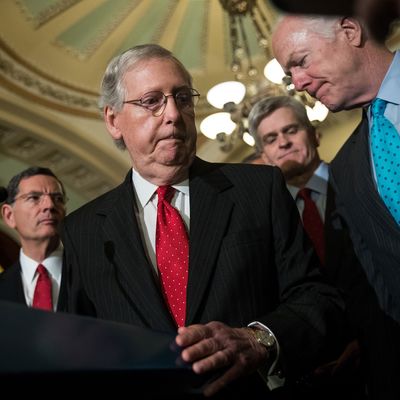
On Tuesday, the inevitable happened: Lacking the support to move forward with a vote, Senate Republicans officially abandoned the Graham-Cassidy bill, their latest and perhaps most draconian effort yet to repeal and replace the Affordable Care Act. If the news sounded familiar, it’s because the same headline has seemingly been playing on a loop since President Trump took office. At this point, the sequence of events has become predictable: a breaking-news alert that repeal efforts have foundered, a few wistful quotes from GOP senators still processing their failure to snatch health care away from millions, beaten-down liberals showering Susan Collins with inordinate amounts of gratitude, and journalists overconfidently declaring the matter over and done with.
The various repeal-and-replace efforts have blurred together so much that it’s become difficult to answer the most important question: Which one’s defeat was the most cathartic for liberals? Below, a handy ranking to the best efforts, ranked by satisfaction in watching them crash and burn:
4) The Ones While Obama Was President
Back when the real-world stakes were exactly zero, a Republican Congress had little difficulty “repealing” Obamacare. Between the laws’s contentious passage in 2010 to the end of the Obama presidency, House and Senate Republicans voted to cut funding or to fully dismantle the bill, over and over and over — with every faux-triumphant effort guaranteed to meet either legislative failure or the business end of President Obama’s veto pen. But it wasn’t much fun watching Republicans fail when they knew full well that their vote was merely symbolic. The real danger, it was understood, would come only if a Republican managed to win the presidency. Because surely, during all those years of railing against the Affordable Care Act and explicitly promising to replace it given the chance, Republican had developed a comprehensive plan to do so when the appointed hour finally arrived. Right? Right?
3) Graham-Cassidy
By the time Susan Collins announced her opposition on Monday, joining Rand Paul and John McCain to sink the bill before it reached the Senate floor, the air had already been let out of the Graham-Cassidy balloon. The bill began as a Hail Mary attempt to repeal the law before budget-reconciliation rules expire on September 30, making it impossible to accomplish without 60 votes after that date. It briefly seemed plausible that the thing could actually succeed. (The amount of panic at the beginning of a repeal effort, it should be noted, is highly correlated to the level of fulfillment when it crumples.) But thanks to objections about the abject cruelty of the legislation, and the incredibly slapdash process behind it, from the likes of noted policy wonk Jimmy Kimmel, Graham-Cassidy died before it could live. This time around, though, a sense of exhaustion mingled with the jubilation, along with the resigned knowledge that this was probably not the GOP’s last hurrah, however many times “last-ditch” appeared in stories. All in all, the episode felt like a hastily thrown together and satisfying sequel: the Friday the 13th Part VIII of Obamacare repeal.
2) The American Health Care Act
Before Trump took office, Paul Ryan promised quick action on Obamacare repeal, and in the heady early days of the presidency, Republicans’ complete incompetence as a ruling party wasn’t yet blindingly obvious. So when the House finally put together a Frankenstein’s monster of a bill called the American Health Care Act, it seemed more likely than not to win passage. But in what would become a familiar dynamic, the bill divided moderate and conservative members of the GOP caucus to the point of unworkability. Ryan was forced to pull it from the floor in embarrassing fashion, then admit that Obamacare was still the “law of the land” in a deeply satisfying press conference. It was the first major legislative defeat of the Trump era, the dawning of President Trump’s ongoing health-care recriminations, and it felt thrilling, intoxicating, a little like the first days of spring.
But reports of the bill’s death had been greatly exaggerated. Just three weeks later, a few conservatives got some kickbacks and House Republicans passed the bill in a squeaker after all. President Trump and friends’ boisterous, preemptive celebration in the Rose Garden now plays like a piece of camp comedy, but at the time there was nothing funny about it.
1) ‘Skinny Repeal’
In terms of substance, “skinny repeal” — less colorfully known as BCRA —was a bit of a snoozer. Sure, the legislation was morally toxic, but in order to satisfy some GOP moderates, it would have kept many key Obamacare provisions in place. Dramatically speaking, though, this was better than Cats. Mitch McConnell ripped up the House’s bill from March, wrote a new one in private (with the help of a few dubious men), then released it hours before the vote, with the kind of transparency and good faith we’ve come to expect from the Senate Majority Leader. Conservative senators lined up to bash the bill, then bizarrely said they’d vote for it anyway, if Paul Ryan promised to modify it in the House of Representatives, which he didn’t.
Then there was the unforgettable spectacle of the vote itself: a beaming Mike Pence emerging from a limo to break a possible tie in the Senate. A brain cancer–stricken John McCain arriving to hearty cheers from his colleagues. The excruciating minutes, then hours, of live-action Senate strong-arming, as it became clear that maybe something unexpected was about to happen. And then the coup de grâce, the Renaissance painting–worthy scene just before 2 a.m., when McCain delivered his now-famous thumbs-down, which is about 20 times better set to a professional wrestling soundtrack. We’re unlikely to see those kinds of theatrics again until Robert Mueller starts indicting people.
In remarks on the Senate floor after the vote, an emotional McConnell said that “this is a disappointment. A disappointment indeed.”
Agree to disagree, Mitch.






























